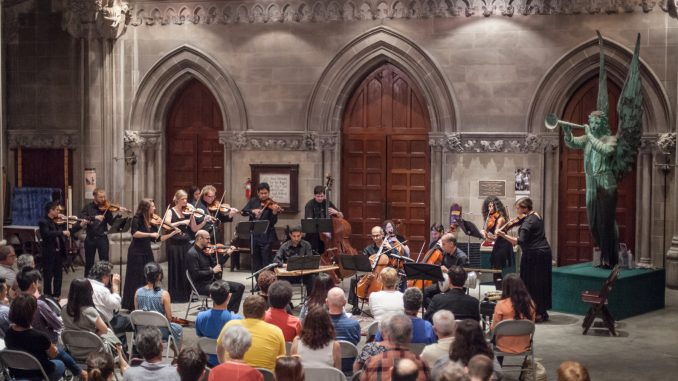
Inside the Church of the Advocate’s sanctuary, Hanna Khoury stood quietly as the musicians rehearsed their pieces one last time. He shook his head gently, his left foot tapping to the rhythm of the drums. On stage, the musicians followed the melody and not in anyone’s direction. When they wanted to stop, they looked at each other and mildly nodded.
“The sound of the music is wonderful,” said Diana Danot, who came from Ocean City, N.J. to attend the event. “I haven’t heard anything like it before.”
“Musical Encounters,” a three-concert event, brought together Al-Bustan Takht, an ensemble made up of world-renowned musicians in classical Arab music and Prometheus Chamber Orchestra, Philadelphia’s self-managed, self-conducted string ensemble. The final concert was held in the Church of the Advocate at 18th and Diamond streets.
“The purpose of the program is presenting one concert in three different neighborhoods and reaching out to the community,” said Hazami Sayed, executive director in the opening remarks. “[It’s] to showcase the combination of Western classical music and music from the East.”
The previous concerts were held at the Unitarian Society of Germantown and Oxford Mills, which is located in Olde Kensington.
The Takht ensemble is a branch of Al-Bustan Seeds of Culture, a non-profit organization based in Philadelphia that seeks to promote conversation and understanding of Arab culture. Al-Bustan has an educational approach with K-12 summer camps and after-school programs to “expose and educate youth and adults of Arab and non-Arab heritage,” according to its website.
“Sayed wanted to find a forum to connect with the Arab culture but not religion based, so she sought out different art forms because they exclude any political or religious affiliation,” said Hanna Khoury, The Takht Ensemble’s music director since 2009.
Al-Bustan emphasizes the education of Arab language, history and culture through choir, dance and percussion, Khoury said.
Founded in 2013, Prometheus, which consists of mostly Temple alumni, took residency at the Church of the Advocate because of its proximity to the university. With frequent shows running and a new season about to unveil, Prometheus offers “high quality entertainment” for the underserved community free of charge, Johnson said.
For the last concert to return to Prometheus’s home, the members of the ensemble wanted the music to foster the neighborhood and the people of North Philadelphia who have been supporting and nurturing its existence.
“Prometheus was born out of the crossroads,” said Johnson, who is the co-founder of the self-managed ensemble. “[It is] where we try to change the way we experience music for both the audience and the performers.”
The mix-and-match production from Prometheus and Al-Bustan Takht traces back to Temple’s Boyer School of Music in 2009. Vena Johnson, who graduated in 2010, was a Violin Performance and Music Education major when she first met Hanna Khoury, who was pursuing a Master of Music Performance at the school.
After their path diverted, Khoury became the Music Director for Al-Bustan Music and led Al-Bustan Takht Ensemble to tour and record with prominent orchestras as well as collaborating with musicians like Lebanese singer Fairouz, Sting and Shakira.
When they met again in 2014, Prometheus collaborated with Al-Bustan to present Marcel Khalife, a well-known Lebanese composer, at Haverford College. After the premiere’s success, the idea of an Arab-Western classical concert consummated into Musical Encounters. Al-Bustan Seeds of Culture was then able to secure funding from PNC Arts Alive, a large initiative designed to support the visual and performing arts in the Greater Philadelphia region, Hazami Sayed said.
The concert started with Prometheus playing a piece by Baroque composer, Antonio Vivaldi. The tacit arrangement was communicated through eye contact and nods, without a conductor.
The distinctive sound of “qanun”, a large string instrument popular in the Middle East, along with the playful, lively and fast-paced sound of percussion added an Arab fusion to popular pieces and genres like Spain by Chick Corea and El Cumbanchero by Rafael Hernandez, a famous Puerto Rican composer.
“It was phenomenal,” said Serge El Helou, the composer of “Lebanese Rhapsody” after his piece was played by Prometheus and Al-Bustan Takht. “My music was made alive.”
Anh Nguyen can be reached at anh.ng@temple.edu.


Be the first to comment